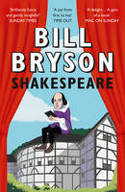 hoping for sheer escapism with chortling feel-good overtones. But for goodness sake, Bryson made me think. Again. I've been trying very hard not to do that. It's a hard habit to break.
hoping for sheer escapism with chortling feel-good overtones. But for goodness sake, Bryson made me think. Again. I've been trying very hard not to do that. It's a hard habit to break.There's the trademark Bryson Drollness throughout, but in the main 'tis a verily fine example of authentic research - with more than a mere suggestion of the need to Take Your Expectations Out of Their Paper Bag and Smash Them to Smithereens With a Very Heavy, Blunt Instrument.
TYEOTPBSTTSWVHBI; This is a new literary term that I've just coined - although conventional wisdom suggests it's not going to stand the test of time. Probably a bit long, and possibly a little too violent to get a PG13+ rating. You know how censorship is at the moment. And yes, despite the implied violence, it does lack punch.
Anyway, Bryson's book - as with any good research - does raise more questions than it answers. It was a surprise (at least to me) to find out that contemporary Thomas Heywood wrote or co-wrote more than five times the number of plays that Shakespeare wrote. So how come he didn't get his own Dewey number?
With his unique turn of phrase, Bryson variously describes Shakespeare's writing "as marked with a messy exuberance", "invigoratingly wayward", and parts that "defeat interpretation" by the experts. These are all virtues that will hearten Joe and Jane Blogger.
And isn't it great for the average semi-literate student of any age to find out that in the six surviving signatures of Shakespeare, he doesn't worry too much about spelling even his own name in any consistent way. Sheesh, the accepted spelling now in use isn't one that the writer himself ever used.
So here's a little homework for those replete with festive fare of all kinds. What the heck is meant by "swithald footed thrice the old, a nellthu night more and her nine fold". (King Lear) I've got a few interpretations of my own, but I think in this context it pretty much means I should sign off and go read something else.

do you know where exactly this line is tob be found in the play itself?
ReplyDelete